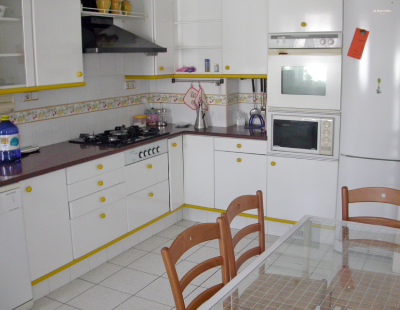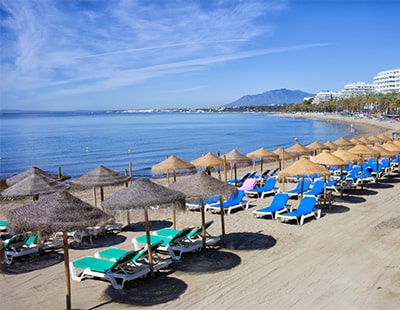There was little to no forewarning of the changes on both occasions, which has led to disarray, confusion, concern and panic among British holidaymakers and visitors to Spain – many of whom were already in the country, in the middle or even at the start of their holidays, when the decision was made.
This included Grant Shapps, the Transport Secretary, who flew to Spain on Saturday despite apparently knowing a quarantine requirement could be imposed on the Sunday. He said he decided he had to stay in Spain to avoid a possible public backlash about returning with inside information before the rules came into force.
He's since said in a statement that he will return to the UK this week in order to complete his quarantine and return to work as soon as possible.
His colleague, Michael Gove, has announced that he cancelled his planned holiday to one of the Balearic Islands in light of the recent change.
Spain is now battling to save its troubled tourism industry – which only restarted recently after one of the world’s strictest lockdowns – with government officials insisting that the virus is under control and calling for certain areas to be exempt from the UK self-isolation order.
Cases in popular holiday home and tourist hotspots, including the Balearic and Canary Islands, the Costa del Sol and Benidorm, are still relatively low and have not reported surges in infection rates.
Spain’s tourism sector relies heavily on Britain, with around 18 million Britons travelling to the country in 2019 – approximately a quarter of all arrivals in Spain. Equally, some 400,000 people from the UK own a second home in Spain.
The news comes only a month after Spain reopened its borders to Brits after a bespoke agreement was reached between the Spanish and UK authorities, and only a few weeks after Spain was put on the exemption list in the first place.
Why now?
In recent days, Spain's rate of infection has jumped to a worrying degree. Although Covid-19 remains under control in many parts of Spain, certain areas - especially Catalonia in the north-east and the neighbouring region of Aragón - have witnessed a large spike in infections.
Overall, the country recorded 39.4 cases per 100,000 inhabitants over the last two weeks, according to the European Centre for Disease Prevention and Control (ECDC). That’s in comparison to the UK and neighbouring France, which both have a figure of 14.6 infections per 100,000 citizens.
Four million residents in Catalonia – where holiday hotspot Barcelona is the regional capital – have been issued with stay-at-home orders as Spain tries to prevent a dangerous second wave. On Monday, Quim Torra, Catalonia’s President, said even stricter lockdown measures haven’t been ruled out if infection numbers don’t improve in the next 10 days.
Britain isn’t on its own in tightening restrictions on travellers from Spain, with Germany warning against unnecessary travel to Spain's worst affected regions, while Norway reimposed a 10-day quarantine from people arriving from Spain on Saturday. France has also been telling its citizens to steer clear of Catalonia.
Air bridges for the islands?
Throughout Monday, it seemed like all may not be lost for travellers wanting to head to the Spanish islands without self-isolating for 14 days upon their return.
A source for the UK government confirmed that the Spanish government was lobbying for the Balearic and Canary Islands to be exempt from the quarantine policy, and that discussions on the matter had taken place. However, by the end of Monday, the government was advising against all but essential travel to the Balaerics and Canaries, which includes popular destinations such as Mallorca, Menorca, Tenerife, Lanzarote and Ibiza, as well as mainland Spain.
An air bridge would mean that people arriving in the UK from the islands would not need to self-isolate for 14 days, but this now seems increasingly unlikely as the government opts for a blanket approach to lessen confusion.
The most recent data from the islands suggests that the rate of infections there are much lower than mainland Spain, where more than 900 cases were reported last Friday.
Jet2, having previously said it would be running its normal scheudle of flights, changed that advice late on Monday, urging passengers not to go to the airport after cancelling flights to all Spanish destinations from Tuesday. It said it would be running a schedule of flights back from mainland Spain and the islands on Tuesday.
Meanwhile, package holiday operator Tui revealed that it would be cancelling all its packages to the Balearic and Canary Islands until the end of July and to mainland Spain until August 9.
EasyJet, British Airways and Ryanair are continuing to operate full schedules of flights to Spain, as before, although EasyJet announced its holidays would be cancelled for the next few weeks.
"We have considered the overall situation for British nationals travelling to and from the Balearic and Canary Islands, including the impact of the requirement to self-isolate on return to the UK, and concluded that we should advise British nationals against all non-essential travel to the whole of Spain," a Foreign Office spokesman said.
Pedro Sanchez, the Spanish Prime Minister, called the UK's decision to reimpose a 14-day quarantine an 'error' - applying, as it does, to the whole of Spain, rather than being done on a regionalised basis.
According to the BBC, the UK government has defended the fresh quarantine rules on everyone arriving from Spain, after the Spanish PM labelled it 'unjust'.
"We respectfully disagree with the Spanish government's position on this," government minister Simon Clarke told BBC Breakfast. "We obviously continue to work closely with them [Spain] and we wish them every success in managing this outbreak, but we've seen a very sharp increase in cases in Spain."
"A 75% increase in cases reported between the middle of last week and the end of last week. That's why we took the action that we have."
The situation remains fast-moving, and could look very different in a month’s time, but for now property investors and Spanish second home owners will need to weigh up if they can afford to self-isolate for 14 days upon their return.
For now, transactions and business might be better off carried out remotely. There will also be the hope, forlorn as it seems now, that Spain’s tourism market won’t be completely devastated by the latest restrictions, which could cause issues for those who let out their overseas investments.










.png)









Join the conversation
Be the first to comment (please use the comment box below)
Please login to comment